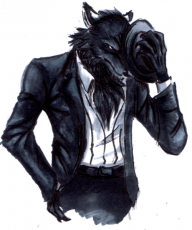Difference between revisions of "Da Volfman"
(Created page with "{{Infobox musician |name=Sejm "Da Volfman" Obraska |image=Da_volfman.png |caption=Known for his aversion to cameras, Da Volfman often had artists sketch him for album promotio...") |
|||
| (2 intermediate revisions by the same user not shown) | |||
| Line 11: | Line 11: | ||
|associated_acts=[[Da Volfman and His Three Trumpet Band]], [[Da Volfman Experience]] | |associated_acts=[[Da Volfman and His Three Trumpet Band]], [[Da Volfman Experience]] | ||
}} | }} | ||
| + | |||
| + | '''Sejm Obraska''' (born September 12, 1949), better known by his stage name '''Da Volfman''', is a [[Hemlander-Myrorian]] blues musician. He is often considered the "father of the Pelagian blues". | ||
| + | |||
| + | Da Volfman grew up in a village outside [[Novajot]], then part of [[Eluvatar]], and was playing trumpet in local bars by age seventeen, emulating renowned blues artists. In 1967, he headed to the city of Novajot, hoping to attract attention by labels local and international. In 1969, he was signed with Myrorian label Triple Sec Records and moved to the city of [[Pelagis]], where he continued to play the bar circuit after his first record, [[Greetings from Hrostvas, Novajot]], was released. Soon after he formed his own group, [[Da Volfman and His Three Trumpet Band]]. | ||
| + | |||
| + | In 1970, his album [[Novajot Mountain High]] debuted at #1 on the Waterfalls Album Chart, and Da Volfman met with almost instant stardom. Two more albums were released in 1972 and 1973, [[Big Train Keep on Rolling]] and [[The Three Trumpet Band Goes National!]], respectively. Following a year-long hiatus, Da Volfman released an experimental psychedelic rock album with his new band [[Da Volfman Experience]]. The album, titled [[Radio Bennland]], was critically panned and considered a commercial flop - though its reputation has recovered somewhat recently. | ||
| + | |||
| + | Following the failure of Radio Bennland, Da Volfman took a 15-year-long hiatus from music, spending most of his time writing at his home in [[Fellowmoor]]. In 1990 he released his comeback album, [[Journey]], which was critically praised and widely considered a "back to basics" piece. | ||
| + | |||
| + | Da Volfman's influence on Myrorian popular music in the 1970s was undeniable; he was often credited with starting the jazz-and-blues revival craze of that decade. His use of brass and vocals is also often cited as the link between Eluvataran popular music and Myrorian. | ||
Latest revision as of 17:04, 21 March 2015
| Sejm "Da Volfman" Obraska | |
|---|---|

| |
| Known for his aversion to cameras, Da Volfman often had artists sketch him for album promotion. | |
| Personal details | |
| Born | September 12, 1949 |
| Genres | blues, jazz, blues-rock, jazz fusion, psychedelic rock |
| Occupations | singer, songwriter, trumpet player, bandleader |
| Instruments | vocals, trumpet, guitar |
| Years active | 1967-1975, 1990-present |
| Labels | Triple Sec Records, Travaltown, Congress |
| Associated acts | Da Volfman and His Three Trumpet Band, Da Volfman Experience |
Sejm Obraska (born September 12, 1949), better known by his stage name Da Volfman, is a Hemlander-Myrorian blues musician. He is often considered the "father of the Pelagian blues".
Da Volfman grew up in a village outside Novajot, then part of Eluvatar, and was playing trumpet in local bars by age seventeen, emulating renowned blues artists. In 1967, he headed to the city of Novajot, hoping to attract attention by labels local and international. In 1969, he was signed with Myrorian label Triple Sec Records and moved to the city of Pelagis, where he continued to play the bar circuit after his first record, Greetings from Hrostvas, Novajot, was released. Soon after he formed his own group, Da Volfman and His Three Trumpet Band.
In 1970, his album Novajot Mountain High debuted at #1 on the Waterfalls Album Chart, and Da Volfman met with almost instant stardom. Two more albums were released in 1972 and 1973, Big Train Keep on Rolling and The Three Trumpet Band Goes National!, respectively. Following a year-long hiatus, Da Volfman released an experimental psychedelic rock album with his new band Da Volfman Experience. The album, titled Radio Bennland, was critically panned and considered a commercial flop - though its reputation has recovered somewhat recently.
Following the failure of Radio Bennland, Da Volfman took a 15-year-long hiatus from music, spending most of his time writing at his home in Fellowmoor. In 1990 he released his comeback album, Journey, which was critically praised and widely considered a "back to basics" piece.
Da Volfman's influence on Myrorian popular music in the 1970s was undeniable; he was often credited with starting the jazz-and-blues revival craze of that decade. His use of brass and vocals is also often cited as the link between Eluvataran popular music and Myrorian.